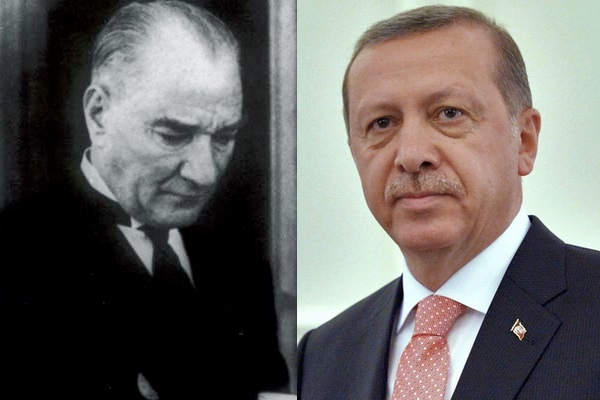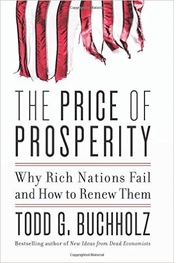Turkey’s in Trouble. Is Ataturk the Cure?

Mustafa Kemal Atatürk and Recep Tayyip Erdogan
Turkey is troubled. Tuesday’s murderous attack at the Istanbul airport left 41 dead and showed that the foes of Turkish civil society are plotting from within. Across its borders, you can find ISIS, Al-Qaeda, and the Syrian army, enemies all. Within its borders, Turkey feels splintered, with President Recep Tayyip Erdogan cracking down on violent Kurdish separatists, as well as non-violent judges who question his broad authority and criticize steps he has taken to bring Islam back into the once-secular public square. In the past month, insurgents blew up a police station in Istanbul, his police raided the largest newspaper (Zaman), and he dismissed his Prime Minister. He also called women who work instead of raising babies and doing housework “half persons.” A pessimist might say that the situation is impossible, that Turks and their leaders simply do not have the desire, drive or the talent to come together in a more civil society. But such a pessimist forgets the challenges overcome almost ninety years ago by the father of the Turkish Republic, Kemal Ataturk, after whom the Istanbul airport is named. Because Ataturk was a devout secularist and Erdogan is a devout Muslim, it is hard for Erdogan to praise or take guidance from Turkey’s founding father. But he should.
 Once
mighty under Suleiman the Magnificent, by the turn of the twentieth
century, the Ottoman Empire looked disheveled and shrunken. It was
losing territory and any sense of hope. Serbia, Bulgaria, Moldavia,
Monetenegro and parts of Greece had crept away. Mobbed with
refugees, the Empire had “fallen into a state of decrepitude,”
said Tsar Nicholas. Nicholas’s comment was translated as the “sick
man of Europe,” a tag that ever since has traveled around Europe
like a tour bus, stopping in England in the 1970s and more recently
in Portugal and Greece.
Once
mighty under Suleiman the Magnificent, by the turn of the twentieth
century, the Ottoman Empire looked disheveled and shrunken. It was
losing territory and any sense of hope. Serbia, Bulgaria, Moldavia,
Monetenegro and parts of Greece had crept away. Mobbed with
refugees, the Empire had “fallen into a state of decrepitude,”
said Tsar Nicholas. Nicholas’s comment was translated as the “sick
man of Europe,” a tag that ever since has traveled around Europe
like a tour bus, stopping in England in the 1970s and more recently
in Portugal and Greece.
The Ottoman Empire collapsed as World War I ended, carved up by British and French diplomats who clashed over serious and non-serious matters, including who got to regulate houses of prostitution. In February 1919 French commander General Louis Franchet d’Esperey rode triumphantly into Constantinople on a white horse. The joke was on him, because British general Edward Allenby had already arrived on his own white horse a day earlier. A British officer scoffed that it was “like having two prima donnas on the stage together and the play went much better if we could keep one in her dressing room.”
Amid the chaos and humiliation, a 23-year old reporter for the Toronto Star warned of a widespread “massacre.” His name was Ernest Hemingway. He described a “tight-drawn, electric tension in Constantinople such as people who live in a city that has never been invaded can [not] imagine.” Could the threadbare remnants of the Ottomans be turned into a republic? It seemed ludicrous. The Empire had been ruled by sultans and viziers with no national loyalty. Under the gaze of the sultan, who simultaneously served as caliph, the Empire had sought to protect Islam, not exalt up any individual nation. Nationalism was a pagan totem, and a nation’s flag was no better than a graven image forbidden by scripture. One hadith puts forth a disturbing image: “He who calls for Asabiyyh (nationalism/tribalism) is as if he bit his father’s genitals.”
Ataturk devised a daring plan to build a new Turkish Republic from the rubble. In a short time, he overthrew the caliph, gave voting rights to women and protected gays, while creating a new Turkish patriotism. He was one of the boldest leaders ever known. My daughter’s 925-page AP World History textbook assigns just a few sentences to Ataturk, about the same as it allocates to “Evita” Peron—which tells you how much Andrew Lloyd Weber and Madonna can influence serious historians.
Ataturk had earned the rank of general and carried a gun. But after he took office in 1923 he mostly ruled Turkey like a man who held out a dove. Though his army still had the firepower to overwhelm Greece, he never tried to take back Salonica, his birthplace (now Thessaloniki). Nor did he exploit revolts against Libya’s Italian occupiers or political quakes across Arabia as an excuse to send his army marching to swipe oil wells and restore the Empire. Imperialism was over. This, I think, is one of the most important accomplishments in political history over the past two hundred years: Ataturk would lead a nation based on nationalism—but this nation would not turn into an imperialist conqueror, even of its weaker neighbors. Critics of nationalism assume that such feelings always translate into plundered neighbors. But Ataturk gives us hope that we can resuscitate morale without letting slip the mad dogs of war.
Ataturk knew that his biggest challenges were at home. The Turks had been taught to be ashamed of the very name, Turk, which connoted a nomadic hick. Literacy rates were dreadful, about 10 percent for men and less than 5 percent for women. Ataturk almost immediately began to publicly celebrate science, open up universities, and encourage women to get educated: “My people are going to learn the principles of democracy, the dictates of truth and the teachings of science,” he said.
He invited Western composers to tour, decried Fundamentalist Islam’s veils, and even introduced an entirely new alphabet, which he believed would raise literacy rates. Instead of Arabic script, children would learn the Turkish language with Latin (Western) letters, which would more easily allow for the multiple vowels in the Turkish language. Instead of calling the letters “Latin,” he described them as “Turkish” and they become a symbol of patriotism. Ataturk personally toted blackboards around the country, and joined in the nationwide teach-in for Turkish literacy. Literacy rates doubled from 1923 to 1938 (Erdogan has taken a step backward and is trying to revive the old Ottoman language).
Having created a new alphabet, Ataturk still needed to redefine for the present the very word Turk. He used the phrase “a good Turk.” A good Turk would be proud, diligent, and confident. The cynic would say it sounded like a Boy Scout pledge. But symbols and words matter. “A good Turk” could be applied to a bricklayer as well as to an artist. A good Turk would learn to play music with discipline or show up for work on time to lay bricks. Ataturk told his countrymen that the word Turk comes from turka, meaning strong. In the haunting movie Midnight Express, which is rightly despised by anyone affiliated with the Turkish tourist bureau, the imprisoned American spends his day walking clockwise around a large stone wheel along with other inmates, most of them addled or crazed. One day the American decides to rebel. He begins to walk counterclockwise. The others try to convince him or push him in the correct direction. One of them, trying to be helpful, grabs his shirt and says, “A good Turk always walks to the right.” The point here is not the direction or the disturbing prison. The point is that even a prisoner thinks that he should aspire to be a “good Turk.”
But could this work? Could Western science and a dash of Turkish nationalistic pseudoscience sufficiently bind a nation together? The economy held up well enough that Turkey did not spin into the hyperinflation of Weimar in the 1920s or the crippling Great Depression that spurred fascism in the 1930s. Turkey performed better than the other losers from World War I and avoided fascism, communism, disintegration, and annihilation. Each of those four disasters was a real possibility.
Ataturk was mostly adored by his public and applauded by foreign leaders. Critics said he was dictatorial and he often was. Multiparty democracy did not come until well after Ataturk left. He did not acknowledge the plight of Kurds and Armenians. But what individual, commission, or gang would have done better? I was recently speaking with a Turkish political scientist who told me that Ataturk “moved too fast” with his reforms and should have spread them out over a long period of time. I am not convinced. If the Turkish republic had begun by forming committees and subcommittees to determine whether women should have equal rights or whether secular science should be taught in classrooms, those meetings might still not be adjourned.
Ataturk was in many ways an extremist. But an extremist in the pursuit of what? I am reminded of Barry Goldwater’s controversial pronouncement that “extremism in the defense of liberty is no vice! And . . . moderation in the pursuit of justice is no virtue.” Ataturk was no saint and his motives could be infected by egoism. And yet he managed to drag a defeated polyglot empire toward civilization and to simultaneously restore its pride. And that pride would not be based on the will of heaven, but on the hard work of men—and women. It is hard work and a shared sense of history and community that define patriotism, not bombs and bullets fired across borders. It’s not too late for the Turks to renew their country, but Erdogan should heed some lessons from the man whose memory he’d like his countrymen to forget.